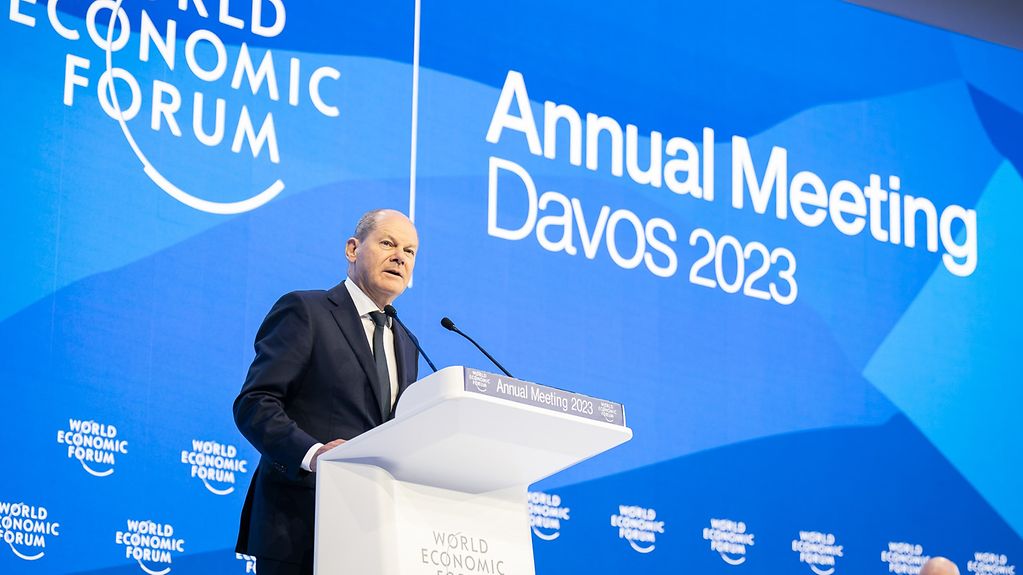Federal Chancellor Scholz addresses the World Economic Forum
In a speech to this year’s meeting of the World Economic Forum in Davos, Federal Chancellor Scholz reflected on how last year had brought fundamental changes to Germany, but Germany had changed fundamentally as well. He stressed how Germany can be flexible, unbureaucratic and fast, and that the new German speed was the benchmark for the transformation of Germany’s economy.

In Davos Scholz stressed that those looking to “invest in the future sustainably with a high return”, need look no further than Germany and Europe”.
Photo: Federal Government/Kugler
The motto of this year’s meeting of the World Economic Forum is “Cooperation in a Fragmented World”. Russia’s war of aggression against Ukraine has brought fundamental changes to Europe and Germany, such as rising energy and manufacturing costs, concerns about a global resurgence in coal and oil, along with new and often more expensive supply chains.
However, in his speech to the World Economic Forum, the Federal Chancellor stressed that Russia had “failed completely” to reach its imperialist goals. Within a few months, Scholz noted, Germany had “made itself completely independent from Russian gas, Russian oil and Russian coal.” It was now crystal-clear to each and every one of us, Scholz said, that “the future belongs solely to renewables.”
The new German speed
Germany wants to be climate-neutral by 2045, Scholz said, while remaining a country with a strong manufacturing sector, so Germany was resolutely pushing forward with decarbonising industry. Within a short period of time, Germany had constructed entirely new import infrastructure for liquefied natural gas which could also be used for hydrogen in future. The Federal Chancellor stressed that this showed how “Germany can be flexible; we can be flexible; we can be unbureaucratic; and we can be fast.” This new “German speed” was the benchmark for the transformation of the whole economy. The Federal Government’s goal was an “electrolysis boom” and the creation of a hydrogen-powered industrial sector “that preserves the climate and is independent of volatile prices for fossil fuels.”
You can watch the Federal Chancellor’s speech to the World Economic Forum in this video.
Germany continues to be competitive
Federal Chancellor Scholz stressed that even when energy prices were high, Germany would still be competitive, particularly in manufacturing “highly specialized research- and technology-intensive industrial products (...) that are needed all around the world." Germany offered a unique ecosystem of highly innovative and adaptable small and medium-sized enterprises, along with high levels of public and private investment in research and development, he said. Scholz also stated that there was a “broad consensus between businesses, employees, and politics that the path to climate neutrality is not just ecologically necessary but also offers new opportunities in global competition”.
Communication and international forums are essential to a climate-neutral future
According to the Federal Chancellor, it was self-evident that a climate-neutral future was not something any single country could achieve on its own. For this reason, Germany was “relying on the market, on competition, on innovation.” Scholz cited the EU emissions trading system as a case in point, which was cutting permissible emission levels while also serving as a catalyst for innovation. However, Scholz stressed that there were a need to create a carbon border adjustment mechanism in Europe, so as to ensure that “the most ambitious are not disadvantaged”. At the same time, Scholz said, the many free trade deals which were in place showed that Europe remained open for international trade.
The international climate club also aimed to prevent “high-emission industries from heading off to countries with less ambitious climate targets.” He also pledged to continue working to improve investment conditions in Europe. Scholz stressed that those looking to “invest in the future sustainably with a high return” need look no further than Germany and Europe.
Earlier, Federal Ministry for Economic Affairs Habeck had also called for greater “global cooperation”. He stressed that the issue of sustainability should never be overlooked. While he supported bilateral trade agreements, he emphasised the importance of adhering to “the idea of multilateral institutions” such as the World Trade Organization. Federal Finance Minister Lindner was also in Davos, where he called for greater cooperation between liberal democracies.
The World Economic Forum is a not-for-profit foundation. It holds its annual general meeting each year in Davos. Leading international economics experts, politicians, intellectuals and journalists come together at the meeting to discuss current global issues.